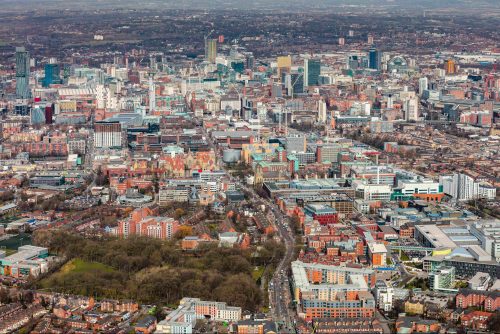Region’s cities see lockdown jump in outstanding business rates checks

Manchester and Liverpool are among the local authorities that have seen the largest increases in the number of outstanding business rates checks as companies sought ways to reduce their costs in the wake of the coronavirus pandemic.
The Valuation Office Agency (VOA) has been swamped by cases based on “material change of circumstance” since the lockdown began.
Businesses have sought to review costs because of the economic crisis with the pandemic resulting in overnight, but potentially-permanent, changes to property values.
“You could say we are on a wartime footing,” said John Webber, head of business rates at Colliers International.
“Covid-19 has led to the biggest Material Change of Circumstance (MCC) the country has seen in rating history and the system has been around for over 400 years.”
Business rates are based on an estimate of the market rental value of a property. With rents falling in response to lockdown and economic problems that has brought in its wake, businesses are making the case that rateable values should also be reduced.
The appeals system has a three-stage process, known as Check, Challenge, Appeal. The first step, Check, is a review of the factual information held by the VOA.
In the three year period from April 2017 to March 2020, there were 158,910 checks registered in England.
But in the next three months, to June 30, 144,910 new checks were registered.
The number of unresolved checks stood at 8,430 at the end of March but at the end of June had jumped to 69,480 – an increase of 720%.
Analysis by TheBusinessDesk.com found the North West had seen a 600% increase in outstanding cases in the three-month period.
Manchester had the second-largest increase in the number of cases in England, outside of London, with Liverpool sixth. Blackpool, Lancaster and Trafford have all seen increases of more than 1000% in the last quarter.
The huge spike in checks will soon send the number of challenges soaring.
The Challenge phase has to be launched within four months of the check decision, or within 16 months if the challenge is about a change in the surrounding area.
On average there is one challenge registered for every four checks. In 2019, the monthly average for challenges was just below 1,500 in England, but if the April-June checks converted into challenges at the same ratio it could spike to more than 12,000 a month.
The number of outstanding challenges had already been climbing steadily – rising in all but one of the 38 months that the 2017 ratings list has been in place – and stood at 18,520 in June.
The focus on business rates valuations is either as a result of the impact of the initial lockdown or on the impact to businesses as they have re-opened.
Webber said: “With social distancing and consumer and worker fears about returning to the shops or offices to work, few businesses in the country are operating on pre-Covid levels. There is no doubt that their circumstances have changed materially.

John Webber, Colliers
“Footfall has reduced massively, and many offices, shops and restaurants remain closed or on reduced capacity – these are all valid reasons to reduce the rating assessments.”
The business rates scheme has come under criticism for a number of years, and is seen as being slow to respond to economic changes – especially by high street retailers – as well as having a slow and cumbersome appeals process.
The wholesale review of valuations was delayed last month until 2023, with business rates calculated by valuations set in 2015.
Webber believes “the bloodbath has only just begun” and is advocating a radical approach to deal with the crisis.
“If the VOA takes its time and waits for all the evidence to come in, many businesses will simply not be around by the time it decides what to do,” he said.
“We urge for a collaborative approach with the VOA getting together with the ratepayers and their agents as soon as possible to agree sensible and fair reductions across the board to those sectors most impacted. This will be essential if businesses are to plan ahead and hopefully work through this crisis.”
“Of course, if we suddenly see a V-shaped recovery, the VOA could remove any extra allowances given – and businesses would pay more again – but for the moment we believe this outlook is unlikely.”








